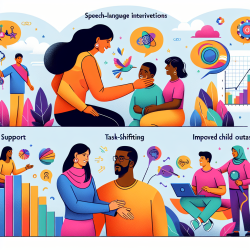Introduction
As a passionate advocate for improving child outcomes through data-driven decisions, I believe that understanding the impact of external events on mental health is crucial for speech-language pathologists and other practitioners. The study titled A national population-based assessment of 2007–2008 election-related violence in Kenya provides valuable insights into the mental health consequences of political violence, which can be leveraged to enhance therapy practices and outcomes.
Understanding the Study
The research conducted in Kenya assessed the prevalence and characteristics of violence following the 2007–2008 elections, as well as its impact on mental health. The study revealed significant increases in both politically-motivated and opportunistic sexual and physical violence during the election period. Notably, symptoms of major depressive disorder (MDD) and posttraumatic stress disorder (PTSD) were prevalent among the affected population, with women experiencing higher rates of MDD and suicidal ideation compared to men.
Implications for Practitioners
For practitioners working with children, understanding the broader context of mental health in conflict-affected regions can inform approaches to therapy. Here are some key takeaways and actionable steps:
- Recognize the Impact of Trauma: Be aware of the potential for trauma-related symptoms in children, especially those from conflict-affected backgrounds. Tailor your therapy approaches to address these needs.
- Incorporate Mental Health Screening: Regularly screen for symptoms of MDD and PTSD in children, particularly those with a history of exposure to violence or displacement. Early identification can lead to more effective interventions.
- Advocate for Comprehensive Care: Collaborate with mental health professionals to provide a holistic approach to care, ensuring that children receive the support they need to address both speech-language and mental health challenges.
- Promote Resilience and Coping Strategies: Integrate resilience-building activities into therapy sessions to help children develop coping mechanisms that can mitigate the effects of trauma.
Encouraging Further Research
The study highlights the importance of continued research into the effects of political violence on mental health. Practitioners are encouraged to engage in or support research initiatives that further explore these connections, particularly in relation to child development and therapy outcomes.
Conclusion
By leveraging the insights from the Kenya election violence study, practitioners can enhance their skills and improve outcomes for children affected by trauma. Understanding the interplay between political violence and mental health is essential for providing effective, compassionate care.
To read the original research paper, please follow this link: A national population-based assessment of 2007–2008 election-related violence in Kenya.










